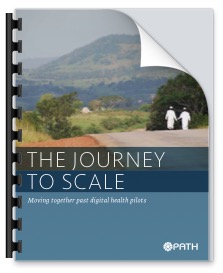
The digital health community is on a journey to deliver health impact. We have achieved considerable success in the past decade, demonstrating that information and communication technology (ICT) can improve health services delivery in the developing world.
Although our achievements implementing pilots should be celebrated, we must also acknowledge that digital health interventions are not yet routinely used as part of all global health service delivery and have not yet been proven to demonstrate large scale health impact.

In The Journey to Scale, commissioned by the Bill & Melinda Gates Foundation to motivate the digital health community to consider new approaches to scaling digital health interventions, we propose that digital health interventions will impact health outcomes significantly only when routinely used, or institutionalized, as a common practice in service delivery.
When institutionalized, digital health interventions will provide frontline health workers with real-time, operational data affecting every conceivable part of the primary care continuum from ensuring adequate stock to checking lab reports to workforce training, thus addressing current capacity issues and improving quality of care. In this way, greater institutionalization will achieve the health impact for which we all strive.
The Journey to Scale is intended to stimulate debate on what targeting institutionalization implies for our investment and collaboration strategies.
The path to institutionalization begins when a common challenge and possible solution emerge and create a case for action. This need and opportunity convince multiple leaders in the value chain to contribute by providing:
- initial seed funding;
- developing effective products;
- supporting standards;
- driving clear value propositions;
- and ultimately embedding the change through policies, program management, and champions.
When the products or services persist beyond catalytic funding and are so embedded in the daily practices at each level of the health system that alternative options no longer seem viable, successful institutionalization has occurred. Examples from some business and global health practices illustrate a common pattern of levers that lead to institutionalization, as shown below:
Lacking a shared goal of achieving institutionalization has fragmented how the digital health community funds and applies these levers, limiting digital health’s potential to become sustainable and dramatically improve health outcomes in developing world markets.
To achieve institutionalization, all stakeholders should adjust current approaches. The community can take several steps to accelerate institutionalization.
- First, we should develop a collective blueprint of existing digital health investments and meaningful measurements of institutionalization. This discussion will help align key actors on milestones indicating progress.
- Second, a few examples of comprehensive, national digital health implementations should be catalyzed and tested.
- Third, we recommend aligning and deepening cross-matrix investments in the seven levers so that they can be broadly shared across countries.
The digital health community contains creative, persistent, and passionate innovators. Our current approaches are not working, however, and we are seeking a more holistic approach to digital health as a component of health systems.
If defining “institutionalization” as our goal resonates, we propose that the community call for ongoing dialogues to refine what institutionalization means, what enables it, how we measure it, and determine what investments we can make together to scale digital health interventions.
The hypotheses and findings of Kate Wilson, Beth Gertz, Breese Arenth, and Nicole Salisbury were based on review of more than 121 books and articles and 40 expert interviews, and are intended to spark an ongoing community debate and new forms of collaboration to reach scale.


We have successfully implementaed ICT based health care
programmes for poor. These are self sustaing models – NO DONATION REQUIRED..
Our areas of work are in
1 addressing blood shortage
2 giving free health insurance angainst blood donation
3 Neo natal & maternal mortality reduced subsaintially
4 Free health care for family against stem cell donation
( THIS MODEL IS ON TRIAL )
We will be happy to help any developing country to design and develope similar / same application
JC SHUKLA
CEO
http://www.nahak.com
jcshukla@nahak.com
j